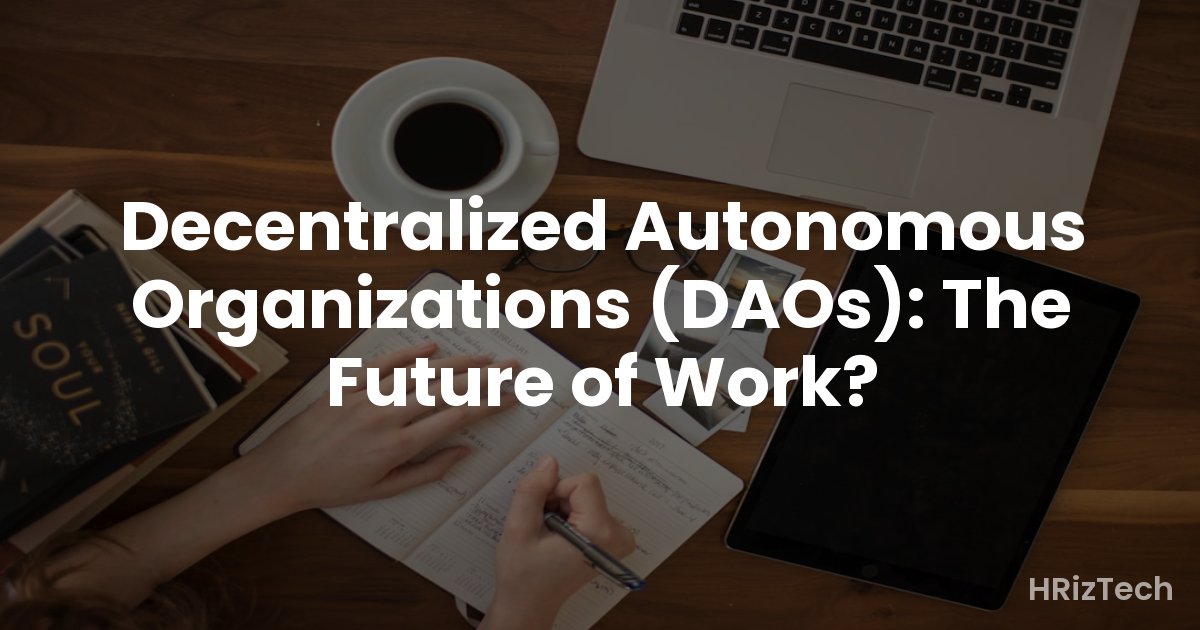Decentralized Autonomous Organizations (DAOs): The Future of Work?

Decentralized Autonomous Organizations (DAOs): The Future of Work?
So, you've heard the buzz around Decentralized Autonomous Organizations, or DAOs. They sound futuristic, maybe a little confusing, and possibly even revolutionary. Are they the future of work? Well, let's dive in and explore this fascinating concept.
- DAOs operate on blockchain technology, fostering transparency and trust.
- Members participate through tokenized governance, influencing decisions directly.
- DAOs offer unique opportunities for remote work and global collaboration.
- Challenges include regulatory uncertainty, scalability issues, and security risks.
- The future of DAOs hinges on addressing these challenges and fostering wider adoption.
What Exactly *Is* a DAO?
Imagine a company run by its members, not a single CEO or board of directors. Decisions are made collectively, transparently, and often automatically through smart contracts. That’s the core idea behind a DAO. It's a completely decentralized organization, existing solely on a blockchain, governed by its members who hold tokens representing their stake and voting power.
This decentralized structure offers several compelling advantages. Transparency is paramount; all transactions and decisions are recorded on the immutable blockchain. This creates a high level of trust, reducing the need for intermediaries and minimizing the risk of corruption.
How Do DAOs Work?
DAOs typically operate using a combination of smart contracts and tokenized governance. Smart contracts are self-executing contracts with the terms of the agreement directly written into code. These contracts automate various processes within the DAO, ensuring that decisions are executed fairly and efficiently.
Members participate in governance by holding tokens. The number of tokens a member holds usually dictates their voting power. This means that the DAO's direction is shaped by the collective will of its participants, rather than a centralized authority. This democratic structure can lead to greater innovation and responsiveness to member needs.
The Allure of DAOs: Why the Hype?
The appeal of DAOs extends beyond their technical novelty. They offer a compelling alternative to traditional organizational structures, particularly in several key areas:
Remote Work and Global Collaboration
DAOs are inherently borderless. Members can be located anywhere in the world, contributing to projects and decision-making regardless of geographical limitations. This opens up incredible opportunities for diverse talent pools and fosters true global collaboration.
Increased Transparency and Accountability
The immutable nature of the blockchain ensures complete transparency in all DAO operations. Every transaction, vote, and decision is publicly viewable, enhancing accountability and reducing the potential for manipulation or fraud.
Community-Driven Innovation
DAOs empower their members to participate directly in shaping the organization's direction. This fosters a sense of ownership and encourages collective innovation. Members are incentivized to contribute and improve the DAO, leading to a more dynamic and responsive organization.
Challenges and Limitations of DAOs
Despite their potential, DAOs are not without their challenges. Several hurdles remain before widespread adoption can be realized:
Regulatory Uncertainty
The legal framework surrounding DAOs is still evolving. Many jurisdictions lack clear regulations on how DAOs should be structured and governed, creating uncertainty for both members and investors.
Scalability Issues
Some DAOs struggle with scalability, particularly those with a large number of members and complex decision-making processes. The blockchain's processing capacity can become a bottleneck, slowing down operations.
Security Risks
Like any technology, DAOs are vulnerable to security breaches. Smart contract vulnerabilities can be exploited by malicious actors, leading to significant financial losses or the compromise of sensitive data.
Complexity and Technical Barriers
Participating in a DAO requires a certain level of technical understanding. The use of cryptocurrencies, smart contracts, and blockchain technology can create a barrier to entry for many individuals.
The Future of DAOs
The future of DAOs is promising but uncertain. Addressing the challenges mentioned above is crucial for achieving widespread adoption. This includes developing clearer regulatory frameworks, improving scalability, enhancing security measures, and simplifying the user experience.
However, if these challenges are overcome, DAOs could fundamentally reshape how organizations operate. Their potential to foster transparency, collaboration, and innovation is immense. The question is not whether DAOs will play a role in the future of work, but rather how significant that role will be.
Key Takeaways
- DAOs offer a decentralized, transparent, and community-driven approach to organizational structure.
- They facilitate global collaboration and remote work, breaking down geographical barriers.
- Challenges include regulatory uncertainty, scalability, security risks, and technical complexity.
- The future of DAOs depends on addressing these challenges and fostering wider adoption.
- DAOs hold significant potential to revolutionize how organizations operate, particularly in fostering innovation and community ownership.
What are your thoughts on the future of DAOs in the workplace? Share your predictions and concerns in the comments below!
Comments
No comments yet. Be the first to comment!